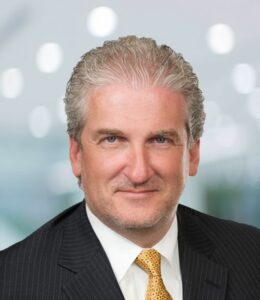Your Teams Are As Unique As Their Fingerprints
The global biotech and consumer health pharmaceutical industries have seen no shortage of disruption in recent years. From managing ongoing supply-chain slowdowns to the development of emergent technologies—all while connecting more closely with consumers— the challenges facing chief executives in the sector can seem insurmountable. Fortunately, Kurt Nielsen, Ph.D., is no stranger to disruption. A seasoned pharmaceutical executive with over 20 years of diverse expertise, Mr. Nielsen most recently served as the CEO and president of Pharmaceutics International, Inc. (Pii), where he brought a measurable track record of success within both business-to-consumer and business-to-business companies.

Prior to his time at Pii, Kurt Nielsen served as the vice president of U.S. development, portfolio, and launch management at Sandoz Inc., a subsidiary of the Novartis group. His responsibilities included spearheading the U.S. development of generic, over-the-counter, and specialty brand products. Notably, Mr. Nielson also held senior leadership positions at Catalent Inc., where he served as the senior vice president of research and development and chief technology officer, as well as at URL Pharma, where he served as executive vice president, of pharmaceuticals. Additionally, he served as the executive director of generic R&D at TEVA Pharmaceuticals.
Recently, IQ had the privilege of conducting an exclusive Q&A interview with Mr. Nielsen, delving into his unique perspective and insights on the evolving paradigm of leadership within the biotech and consumer health pharmaceutical industry, and what qualities future leaders must possess to achieve success in the sector.
IQ: Walk us through your early career background. What led you to pursue a path in biotech and consumer health pharmaceuticals?
Dr. Nielsen: I will try not to get emotional, but it probably goes back to when I was a kid. My grandfather had Alzheimer’s disease and I didn’t really understand why.
I recall thinking ‘Why do these things happen? What can I do to make a difference in the world?’ And I don’t think I knew it at the time, but that was the genesis of my career. Solving those questions really motivated me and drove me to get into the sciences, health care and the pharmaceutical business.
IQ: As an outsider looking in, you have such a well-rounded background and have led teams of all sizes across several high-performing organizations. This issue of IQ is about the ‘Changing Paradigm of Leadership’—what does it take to mobilize teams to accomplish great things?
Dr. Nielsen: That is a great question. There are many avenues that we could go down, but I think the most important variable for leaders today is to have a point of view.
Not in the sense of having a rigid worldview, but rather a perspective—not only about how the world is today, but also how it should be. Granted, there will always be a gap between the present and future state, but our job as leaders is to enroll others toward a greater vision in order to bridge that gap.
IQ: How do you communicate your point of view in order to get people to understand and embrace a shared vision for the future?
Dr. Nielsen: It really starts with authenticity—especially the way that you express your beliefs within your point of view. The authenticity that comes from being genuine is powerful, and it is so easy for people to see it when it is there and to see it when it is not there, even for a second.
It is amazing how perceptive people are, which is ultimately rooted in our survival instincts. People know when a leader is committed to an outcome that they believe is right, which informs the point of view they have.
It is also important to hold on to that vision. When you waiver, your followership begins to question your strategy, and all your effort can begin to unravel—which can feel a bit insidious. So, again, for me it starts with standing for your beliefs; your authentic and genuine expression of that point of view goes a long way.
IQ: Do you find that you take a pragmatic approach when motivating and coaching the leaders that you lead?
Dr. Nielsen: Yes, and it is really important to understand the diversity of thought amongst the team members. People relate to you and your point of view in many different ways because everyone processes information uniquely. People are like fingerprints and everyone is motivated differently.
Understanding and recognizing this can create an environment where you really build a relationship with the people who need to believe in what you’re doing. When teams feel their leaders are just going through the motions, it can be very demotivating. So, from a communication standpoint, it is critical to avoid a cookie-cutter approach. It is critical to communicate in a way that helps you relate to individual people, and then be ruthlessly consistent about it.
IQ: Personally speaking, how much of this did you learn through trial and error? Were there other leaders or managers in your past who helped you formulate this approach?
Dr. Nielsen: Reflecting back on certain portions of my career, I would definitely say there were peers and leaders that I both sought to emulate and avoid, and I tend to separate management and leadership into different camps.
As far as trial and error, absolutely. I might categorize my career as an epic journey—from peak to peak. Which is to say there were plenty of valleys and low points in between.
But that is the benefit of hindsight, right? Naturally, I made plenty of mistakes along the way, yet they were made in an attempt to move people and businesses forward. And over time, regardless of the missteps, you begin to hone your passion for leading others and you seek to reinforce good behaviors through your own actions as a leader.
IQ: There is real data behind what you’re saying: A recent Harvard Business Review study noted that the majority of executives surveyed said that failures and setbacks were some of their strongest teachers as a leader. Which lessons have stuck with you?
Dr. Nielsen: I’m sitting here thinking about the question and it is like my career is flashing before my eyes, right? [Laughter]
Reflecting back on some of my early leadership roles, I think I did not move fast enough when there were performance management issues, as in, somebody is either not able to perform or is in the wrong role. And I probably exhibited all the classic behaviors that you should not do—from avoiding difficult conversations and rationalizing the issue to pretending there is not an underlying problem. When that happens, the issues can snowball into an avalanche of uncorrected actions.
Ultimately, what I learned along the way is how important it is to have regular, informal conversations about what is working and what is not. Almost on a daily basis, I would say. I also learned not to be apprehensive about having conversations about the softer side of the results.
For many of us, especially early in our careers, it is all about results. The mindset can be ‘let’s get it done regardless of how we get there.’ But, if the road to achieving an outcome is brutal, it can be that much harder to achieve similar results the next time around because team members are still dealing with the wake of disruption from the previous initiative.
IQ: I’ve had the opportunity to speak with some of your peers and they describe you as someone who prioritizes inclusiveness. Why is that important to you, and do you see a shift toward greater inclusiveness within the current biotech and consumer health sectors?
Dr. Nielsen: You know, I will probably speak out of both sides of my mouth and say, on one hand, it has not changed. And on the other hand, it is completely different.
Where it has not changed is the essence of leadership. The ability to connect with people so that they understand, not just feel, that they’ve been heard is timeless. When people are heard they are much more likely to sign up to be part of your vision, because they understand that you have taken the time to really synthesize their points of view as well.
And there is real power there—not power over people, but power in the sense that it leads to alignment and enrollment amongst teams and team members. I do not think that ever will change because it is part of being human; the desire to be heard, included, and part of something that’s bigger than yourself.
That said, I think what is different—and what constantly changes—is the values held by each generation of leaders.
IQ: How so?
Dr. Nielsen: Personally speaking, as a product of Generation X, we would be given tasks and it didn’t matter if it took one hour or eight hours to complete it, you needed to get it done and get it done right. There was no question about it. The environment and context for leadership today are very different.
Going back to my previous statement about each person being a fingerprint, the paradigm has shifted toward connecting with teams on an authentic level to inspire and motivate people, which, again, necessitates active listening and really hearing the concerns of the people you lead. That is really the essence of being an effective leader today.
IQ: I like how you said that—the essence of effective leadership is being able to understand and empathize with those you lead to ensure they are understood. I’m curious, as a CEO, how can you ‘train your ear,’ so to speak, in order to assess what is truly important to teams and enterprises?
Dr. Nielsen: For me, there are a few keys. First, when communicating with direct reports, I tend to pick up on the phrases ‘I feel’ or ‘I think’, because there is a distinction there versus a data-driven statement.
As humans, we are driven by emotion. Yet, as leaders, we need to make rational, informed decisions. When someone says ‘I feel’, it is usually because they are expressing a gut feeling. Sometimes it takes a bit of mining, but by drilling down and uncovering the metrics or data behind that gut feeling, you can start to attune your listening for the subtext behind any number of issues an organization might face.
Secondly, in order to really hone your listening, it is critical to genuinely connect with people to understand their thought processes. Which can be easier said than done. As a CEO or leader in today’s world, everyone is incredibly busy, right? Everyone has an agenda to achieve and business has to get done.
Yet, it is essential for executives to be able to relate to people. It’s not always about data itself—sometimes it can be equally as important to understand how others assess data and how that informs their perspective.
IQ: What is the most difficult aspect of leading people in our current business climate?
Dr. Nielsen: I think it is taking the time to make sure you’ve got more than just a cursory level understanding of what motivates people. For instance, why are they telling you what they are telling you? It can be really difficult to focus on this with clarity because of the pace at which business moves today, and because of the expectations around what needs to be delivered.
It is easy to say to yourself, ‘I have to move faster. I have to be more efficient. I need to be more productive,’ but do I really understand what my team needs of me so that they can be effective? I think, in today’s world, getting that right is exceedingly difficult for executives, given the myriad of internal and external pressures to contend with.
IQ: What did you learn about yourself after attaining the role of chief executive? Are there particular lessons that you can only learn once you’ve reached the corner office?
Dr. Nielsen: Yes, to an extent you are alone at the top. Naturally, great CEOs are supported by highly skilled leaders on their executive team, yet all eyes are on you. It is a unique singularity.
On the one hand, you probably knew that going in. But, as a first-time CEO, it does take some adjustment. Once you realize that you must set yourself up for success and pull in the right people in order to have the right conversations about the businesses, you begin to elevate yourself to the next level.
It is also critical to have a coach, mentor, or an outside perspective, which can be transformational. That is because it is easy to fall back on our egos to tell ourselves ‘I got this’, regardless of what is transpiring around us.
I like to say it is a bit like being an Olympic athlete. When you first step into the Olympic stadium, it is natural to feel overwhelmed. There is so much to pay attention to. Then let’s say you run the 100M dash and come in fourth. You may think, wait a minute. I’m used to coming in first…now what?
By pulling in the perspective and advice of others you trust—those who are invested in your success—you begin to hone your ability to see the playing field in three dimensions. In real terms, a trusted advisor can ensure we do not let facts get distorted because of the way we perceive a given situation, which is human nature.
IQ: As you look ahead—let’s say 5-to-10 years from now—what excites you most?
Dr. Nielsen: I get excited by change. As you can imagine, the pharmaceutical industry is infamously conservative and operates within a highly risk-averse environment. And yet, we stand on the precipice of many breakthroughs, particularly due to accelerated technological adoption notably in cell and gene therapy, as well as, biologics including vaccines. The industry is utilizing incredibly large data sets in novel and innovative ways, which can help predict how a product or manufacturing facility may perform in the future, for instance.
The current pace of technological advancement also creates an opportunity to bring data and perspectives from many disparate disciplines together to dynamically collaborate and develop products and solutions that more effectively treat patients and cure diseases. At the end of the day, this is what it is all about, and these emerging technologies will be incredibly effective tools for bringing better treatments to consumers and patients.
IQ: Conversely, what keeps you up at night?
Dr. Nielsen: The irrationality of people, I would say. The concept of what is rational and irrational is driven by an individual’s context. It worries me that people are so comfortable telling melodramatic stories with fabricated facts which are, for whatever reason, irrationally accepted. As a scientist, you are trained that facts are facts. They are often quite boring and not necessarily open to interpretation. What keeps me up at night is the trend of distorting what is factual becoming endemic in our society.
IQ: Speaking of the future, let’s say it’s many years from now and you’re reflecting back on your career. What do you want your legacy to be? What do you hope others say about working with you?
Dr. Nielsen: I would say two things: One is that they enjoyed the experience of working together and, secondly, that the people I led feel they were treated fairly. That doesn’t mean it was always fun, but there was enjoyment in it and they were treated excellently. That’s it. I think at the end of the day, that is what I really hope for.



